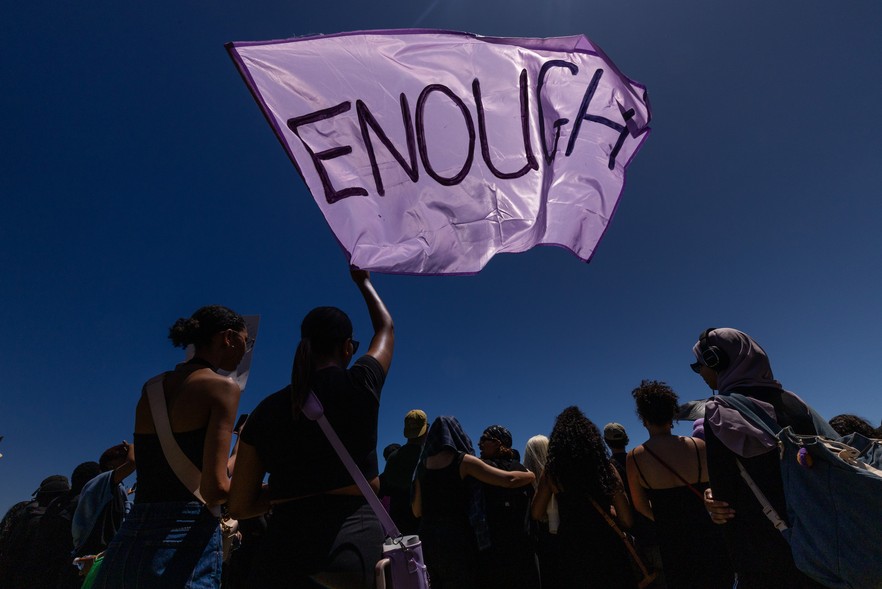
21 November 2025
Demonstrators dressed in black gathered on the Sea Point promenade on Friday to show solidarity with those affected by gender-based violence. Over a thousand people participated in Cape Town. Photo: Ashraf Hendricks
Large demonstrations were held across the country on Friday against gender-based violence, in answer to a nationwide call by what has become known as the Purple Movement.
The protest was timed to coincide with the start of the G20 summit hosted by South Africa.
Head of the National Disaster Management Centre Bongani Elias Sithole has classified GBV and femicide a national disaster in terms of the Disaster Management Act.
Minister of Cooperative Governance and Traditional Affairs Velenkosini Hlabisa welcomed the decision. Hlabisa said that the “persistent and immediate life-safety risks posed by ongoing acts of violence” means that GBV and femicide now meets the “threshold of a potential disaster as defined in the Act”.
Hlabisa noted: “Importantly, this classification does not invoke emergency powers. Instead, it reinforces and strengthens the systems already in place, binding together key initiatives.”
Over a thousand people gathered at Constitutional Hill Precinct in Johannesburg to demonstrate against GBV. Photo: Ihsaan Haffejee
Women for Change, founded in 2016, called on “all women and members of the LGBT+ community across South Africa to refrain from all paid and unpaid work in workplaces, universities, and homes, and to spend no money for the entire day to demonstrate the economic and social impact of their absence”.
“Until South Africa stops burying a woman every 2.5 hours, the G20 cannot speak of growth and progress.”
The movement had also launched a petition to have GBV and femicide declared a national disaster, which has now been answered.
It says: “This crisis demands the immediate mobilisation of national resources and unwavering political commitment on an unprecedented scale to strengthen and transform the national response to the epidemic of violence against women and children.”
The petition sets out a range of actions it wants government to take, including judicial and legislative reforms, funding to implement national strategic plan on GBV and femicide (signed by President Cyril Ramaphosa in April 2020), the full implementation of the National Council on Gender-Based Violence and Femicide Bill, public access to a national sex offenders register, and mandatory education and ongoing awareness campaigns.
Protesters at the Constitutional Hill Precinct in Johannesburg. They wore black and read out the names of victims of GBV. The protesters participated in a “lie in” on the grounds. Photo: Ihsaan Haffejee
In Cape Town, people dressed in black gathered on the Sea Point promenade. At noon a silent lie-down was held for 15 minutes. Photo: Ashraf Hendricks
At Stellenbosch University a G20 Women’s Shutdown was held at Rooiplein. “[We] shut down our own campus so that perpetrators know that they cannot hide in this campus and that the victims are not alone,” said LLB student Malaika Ngwenya, coordinator of the shutdown. Photo: Ishmael Mabena
Hundreds of women, mostly dressed in black and purple gathered at south beach in Durban chanting “Wathinta bafazi wathinta imbokodo” (You strike the women you strike a rock). Photo: Tsoanelo Sefoloko
Hundreds of protestors gathered outside the East London City Hall and marched to Baby-Lee Recreational Park along the beachfront. Photo: Johnnie Isaacs
Nelson Mandela Bay Municipality staff and members of the public stood outside City Hall, Gqeberha. Photo: Thamsanqa Mbovane.